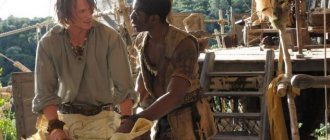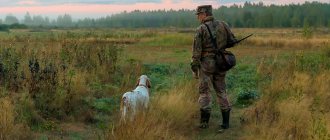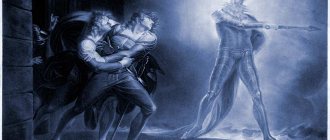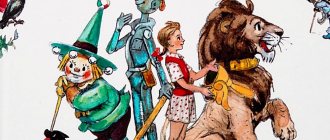- Summary
- Various authors
- Fadeev - Defeat
The well-known work of Alexander Fadeev, written in the 20s, shows us how a person changes during political events, namely, during the years of the civil war.
The action of the story begins with the fact that Commander Levinson entrusts Morozko with a responsible task - to deliver an important package of documents to another detachment. But the fighter does not want to go on such a dangerous and long journey. Then the commander orders him to leave their ranks. After some thought, Morozko agrees to complete the task.
Next we see the life story of a young partisan. He was born into a miner's family, and as a teenager began working on a par with adult workers.
He served, but was seriously wounded and was therefore sent home. Having returned, he thoughtlessly married, and together with his wife they decided to fight for the Soviets. But the White Guards fiercely attack the Red Army and conquer city after city. Morozko had to fight with the partisans.
Heading to the intended place, our hero sees how the enemies are destroying Shaldyba’s detachment, and the soldiers are fleeing the battlefield in disgrace. The commander could not do anything; there were more cowards than brave men. Then Morozko noticed among the fleeing partisans a young guy who, due to his lameness, could not move further, he fell, and none of his fellow soldiers helped him. Then Morozko picked him up and galloped back with him. Although he picked up this boy and brought him to the detachment, he treated him with great distrust. Some inner feeling told him that this fighter could harm his comrades. But, for now, it was too early to draw a conclusion. The commander gave the order to place him in a medical unit, and from the documents everyone learned that it was Pavel Mechik.
Pavel never thought that he, an ordinary boy, would be attacked and violated by some strange people. But, having figured it out later, they accept him into their squad. He felt bad with them. They mocked him in every possible way, constantly swearing. But here it was a completely different world. The sweet nurse who diligently looked after him, the old partisan Pika, with whom he had intimate conversations.
One day, Morozko, on his way from the hospital where he was visiting his wife, tried to steal melons from a villager, but was caught red-handed. Levinson decides at a meeting of partisans to expel the fighter from the detachment, but Morozko takes an oath that he will never commit such an offense again.
The Japanese were increasingly approaching the detachment, and therefore Levinson gave the order to retreat back. After recovery, Mechik was immediately given a horse, but it was so frail that Pavel was offended.
When retreating, it was necessary to take the infirmary with us. But they could not take the seriously wounded Frolov, since they had to move faster. The commander and the doctor want to poison him, but Mechik tries to dissuade them. Frolov, understanding the entire current situation, takes the poisoned drug.
The squad has to retreat all the time. To make a decision, Levinson needed to know their situation, and he sent Metelitsa to reconnaissance. But he was captured by his enemies and died.
When Levinson's squad is ambushed and they manage to shoot back and hide in the forest, the commander leads his soldiers through the swamp. Having successfully crossed, they head to the bridge. Mechik is sent to reconnaissance to find out the state of affairs with the enemy, but spotted by the Cossacks, he cowardly runs away without warning the partisans about the attack. Morozko, on the other hand, warns his comrades with a triple shot, but dies himself.
The detachment breaks through the ambush, losing most of the partisans.
The novel teaches us to be able to bear responsibility in any situation, learn to make independent decisions, not be afraid to express our opinion and commit a fair and courageous act if it is necessary for our comrades.
You can use this text for a reader's diary
Chapter 1. Frost
Morozka was sent by commander Levinson to Shadaba’s detachment in order to deliver a package there. He categorically does not want to go, and persuades the commander to send another. But Levinson replies that if Morozka does not do what he is told, then he will have to take away his weapon and expel him from the squad. Morozka himself was a miner and the fourth son in the family. He didn’t think much about life and did his actions thoughtlessly. During his service he was wounded about six times and shell-shocked twice. He had a wife, Varya, a haulier.
The road to Shandyba turned out to be difficult; on the way the hero came under fire. There he saved a young boy.
Brief summary of the novel “Destruction” by A.A. Fadeev
Orderly Morozka, on the orders of the commander of the partisan detachment Levinson, must take the package to another detachment. He really doesn't want to go. But in this case, Levinson can order Morozka to surrender his weapons. Then the partisan decides to hit the road to deliver the letter. Levinson is the son of a used furniture dealer. He is very patient and persistent. Morozka is a second generation miner. But in his life everything happened somehow spontaneously. It was completely unreasonable to marry Varya, a walking hauler. In 1918, without thinking about what awaited him, Morozka left to defend the Soviets. At the front of the First World War, he was wounded six times and shell-shocked twice. The path to Shandyba's detachment must be long. This is where the package should be delivered. Before Morozka's eyes, a battle takes place between the partisans and the Japanese. When the partisans realize that the Japanese detachment is stronger, they run away, leaving a wounded boy on the battlefield. The partisan picks up the wounded man and returns to Levinson’s detachment. When the wounded Pavel Mechik woke up, he realized that he was out of danger. He ended up in the forest infirmary. Here the first people he saw were Doctor Stashinsky and nurse Varya, Morozka’s wife. Mechik is being looked after and bandaged. Previously, Mechik, when he still lived in the city, dreamed of exploits. The boy decided to go to the partisans. Only disappointment came too quickly. And all because in fact he is weak in character. All his actions are just romantic illusions. He joins the Socialist-Revolutionary Maximalist Party. He is sent to Shandyba's detachment. In the battle, Mechik was wounded in the legs by three bullets. This does not at all coincide with his heroic fantasies. Mechik is trying to get closer to Stashinsky. But Stashinsky learns that Mechik was on the side of the Socialist-Revolutionary Maximalists. The doctor does not want to communicate with the partisan.
Morozna immediately felt hostility towards Mechik.
This feeling did not go away later, when Morozka saw the boy in the infirmary. Morozka's path to another squad continues. The partisan is trying to steal melons from the village chairman Ryabets. The owner notices the thief, and Morozka is left with nothing. Ryabets is outraged and turns to Levinson with a complaint. Morozka is deprived of weapons. In the evening, the soldiers gather to discuss the orderly's behavior. Partisan Dubov, also a former miner, proposes to expel Morozka from the detachment. But the Japanese are approaching. Now every fighter is worth his weight in gold. The soldier’s conscience begins to torment him, and he swears that he will never disgrace the title of partisan in any way. Levinson asks Ryabets to tell the peasants to dry crackers for the soldiers, and orders an increase in the portion of oats for the horses. Levinson does all this because he foresees the outbreak of hostilities. Morozka goes to the infirmary again to check on his wife. He understands that Varya and Mechik sympathize with each other. Morozka had never been jealous of Varya before. But now he is angry with both - his wife and Mechik. And in fact: Mechik fell in love with a young nurse. He really misses the peaceful life in the city. Varya also falls in love with Mechik. Only the boy subconsciously seeks maternal protection in her arms. Mechik dreams of taking Varya with him to the city. Morozka is disgusted by the very idea that next to his wife there could be such a useless person as Mechik. Morozka quarrels with Mechik. Levinson's soul is haunted by doubts. No matter how the fighters think about him, this man can doubt and worry. He carefully weighs all the pros and cons and checks all the facts. When Levinson meets scouts from a neighboring detachment while checking posts, they tell him that their army was defeated by the advancing Japanese. Levinson realizes that there is little chance of victory and orders a retreat. Mechik has already completely recovered. Now he joins the partisan detachment. Levinson gives the fighter the horse Zyuchikha. But she's just not very good. This offends Mechik, because he just can’t figure out how to deal with her. Moreover, he cannot establish contact with the rest of the partisans. He is only friends with former student Chizh. It is Chizh who teaches him how to shirk his responsibilities. The time comes, and Mechik, together with Baklanov, is sent on reconnaissance. On the way, the partisans come across a Japanese detachment. We have to open fire. The soldiers shot three enemies. Two are Cormorants, and one is Mechik. Moreover, the young man was lucky, because he shot at just about anything. The reconnaissance was successful: the main enemy forces were identified. When Mechik returns to the detachment and goes to bed, he sees a terrible dream. In the morning there is a shootout with the Japanese. Mechik does not understand well what is happening. His life is no longer in his hands. The detachment at this time is preparing for the attack. It is especially difficult to evacuate the hospital, because the mortally wounded Frolov is there. Any transportation is dangerous and useless for him. Levinson and Stashinsky decide to give the patient poison. Mechik accidentally overhears this conversation. He wants to interfere with Stashinsky. But Frolov already understood what kind of potion was prepared for him. A mortally wounded man agrees to drink poison. The little sword runs into the forest. There he encounters Varya. The woman tries to calm him down. At a rest stop, Varya comes to the fire. There she sees Mechik and Chizh. She wants to console Mechik, but he behaves coldly. Then Varya gives herself to Chizh, who has been pursuing the woman for a long time. The squad retreats. Mechik is one of the sentries. During the round, a conversation between Levinson and Mechik takes place. Mechik complains that he feels bad in the squad. Levinson understands that, most likely, the guy will be of no use. The commander remembers himself in his youth and concludes that his generation was much stronger than the current fighters. Levinson sends Metelitsa on reconnaissance. The partisan goes to the village. In the forest he leaves his horse to the shepherd girl. Cossacks settled in the village. A fighter enters the house of the squadron commander. But Metelitsa is unlucky - he is caught by the partisans. They interrogate me, and when morning comes, they take me to the square. In the square, a man brings forward the shepherd boy to whom Metelitsa left the horse. The Cossack chief wants to brutally interrogate the boy. Metelitsa rushes to protect the frightened shepherd boy and wants to strangle the boss. The soldier dies, wounded by a Cossack bullet. Without waiting for Metelitsa to return, Levinson orders to march. When the Cossacks set off on their journey, they are discovered by a detachment of partisans and organize an ambush. A battle takes place, during which Morozka’s horse is killed. The Cossacks flee, and the partisans occupy the village. Levinson orders to shoot the man who led the shepherd boy into the square. Morozka is very sad about her horse. He gets drunk with Mechik. Morozki's new horse is called Judas because he was taken from the enemy. At night, Morozka is found by Varya. She wants to make peace with him. He invites him to the hut, but Morozka refuses. Then she takes him to the hayloft. The next morning Morozka feels out of place. When morning comes, the enemy cavalry is sent to the village: Levinson’s detachment has to retreat into the forest - there are too few people left to fight back. The soldiers see a quagmire ahead. There is nowhere to go and there is no retreat either. Levinson orders the swamp to be cleared. Having successfully overcome the obstacle, the detachment heads to the bridge, where the Cossacks set up an ambush. Mechik is sent on reconnaissance mission. He almost falls asleep in the saddle. The Cossacks notice him. Mechik is afraid to warn his squad and runs away. His conscience is not clear. He understands this, but the fear of death wins. Mechik heads back to the city. But behind Mechik was Morozka, who managed to shoot three times to warn his squad. The partisan is killed by the Cossacks. The squad rushes into battle. After this, only nineteen people remain in Levinson’s detachment. But they broke through. Levinson cries, but continues to drive forward.
Chapter 14. Reconnaissance of the blizzard
Metelitsa is sent on reconnaissance; according to orders, he must return at night. But the place where he was sent was much further away, so it was only towards night that he left the taiga. He found himself in a field where a fire was burning, and a boy was sitting next to it. At first he was frightened by the sudden appearance of Metelitsa, but then he calmly said that his parents were killed half a year ago, and that a whole regiment of Cossacks was now stationed in the village. Metelitsa went to the village to scout out something else. But three Cossacks caught him and beat him. In the morning, everyone in the detachment began to worry, because the scout never returned.
The most exciting pages of Alexander Fadeev’s novel “Destruction” for me are associated with the image of Metelitsa, who is generally my favorite hero of this work. The chapter “Reconnaissance of Metelitsa” is dedicated to him. Before that, we meet him only for moments. And from the very first mention of the intelligence officer, a certain idea of him is created: swift, reliable, constantly in action. Fadeev nowhere in the novel gives a complete description of the external appearance of Metelitsa, but from individual “portrait” details a complete image of the young partisan is created. As we read, we feel that the author himself treated his hero very warmly.
“- Uh... ut... The name is Metelitsa...” - ran along the chain again. A few seconds later, bent over like a hawk, Metelitsa rushed by, and the entire squad with unconscious pride accompanied his tenacious shepherd’s landing, not marked by any regulations...”
...Blizzard is revealed especially fully in the last chapters, where Fadeev writes about reconnaissance in the village, for example, in a night meeting with a shepherd boy; I am attracted by his sincere, infectious laughter. It seems to me that the essence of each person can be determined by how he treats children: stern kindness, humor, “affectionate rudeness,” “pathetic, funny, childish” awaken in Metelitsa at the sight of a frightened boy.
The author of the novel often emphasizes the “animal”, tenacious nature of the portrait and manners, and compares Metelitsa with a bird of prey; agility, strength, flexibility, combined with the inner stern kindness of a scout. The contrasting episodic image of an officer also helps to understand Metelitsa: “good-natured, handsome, plump, lazy” - this is how the officer looked when he played cards. After a while, this handsome officer will indifferently watch how the little boy is tortured. Fadeev shows a sharp contrast between his beautiful appearance, soft, good-natured, and spiritual callousness and cruelty.
I, like Levinson, really like Metelitsa “for that extraordinary physical tenacity, animal, vitality that flowed in him with an inexhaustible spring.”
But the main thing about him is, of course, the richness of his soul. Metelitsa is characterized by fearless despair, because of which he falls into the hands of the Cossacks. But even in captivity, even when it becomes clear that “he really won’t escape this time,” it is impossible to break the vital force of Metelitsa. He “concentrates all his strength on that - completely insignificant from the point of view of his own life and death, but which has now become the most important for him - the question of how he, Metelitsa, about which until now there was only dashing and disastrous glory, will be able to show to those people who will beat him, that he is not afraid and despises them.”
The actions of this hero are almost always rash and intuitive. Metelitsa probably doesn’t even know that he is a hero; Only in the last minutes of his life does he mentally formulate the goal of his struggle: “... all the greatest and most important things that he did in life, he, without noticing it, did for the sake of people and for the people.”
And Metelitsa also dies in a rush, trying to implement what came to his mind at headquarters during interrogation, came unexpectedly, suddenly, but not by chance, but as a natural result of his short but wonderful life.”
Reading in the section:
- Episode from the chapter "Squag". The most exciting pages of the novel "Destruction"
Previously published in the section:
- Episode from the chapter "Squag". The most exciting pages of the novel "Destruction"
V. Men and the “coal tribe”
The meeting meets at the school. The men are discussing economic issues: the braids are all patched, and the grass needs to be mowed in time, and the war will cost a pretty penny. The Japanese came to Sundugu, there was no way out, it was alarming. Levinson worries about where to place the wounded and decides to set up a mounted patrol at night.
The miners came in a friendly mass. They believe that Morozka, although he is a little boy, needs to be taught a lesson so that others will be discouraged. Levinson invites the men to decide for themselves how to punish the orderly. Opinions were divided. The tall miner Timofey Dubov condemns Morozka, believes that he is a disgrace to the coal tribe, and proposes to kick the guy out. Demoman Goncharenko defends his comrade, characterizing the fighter as one of his own, reliable, who will not sell out. He invites Morozka to answer himself. The orderly repents and gives the miner's word that he will not let his comrades down again. Levinson invites the fighters to help their owners in their free time. Morozka returns to her usual rhythm of life.
Popular retellings today
- Summary of the story Nikishka's secrets of the Cossacks
Eight-year-old Nikishka is a quiet boy of few words. And although he rarely speaks, he really enjoys listening to adults talk. He doesn't like to play with other village kids. For this they nicknamed him Silent. - Mother of Man - a summary of Zakrutkin’s novel
The work tells about the events that took place during the Great Patriotic War on Belarusian territory. The story is narrated on behalf of the narrator, a former military man who is in the Carpathian town - Evgeniy Nosov
The talented writer E.I. Nosov was born in the village. Tolmachevo (Kursk region) in 1925 on January 15. A quiet village located near the Seim River. The father of the future writer is a hereditary artisan - Summary of the story Peresalil Chekhov
The genre orientation of the work allows us to classify it as a short satirical story, the main theme of which is the commission of extraordinary actions by a person






